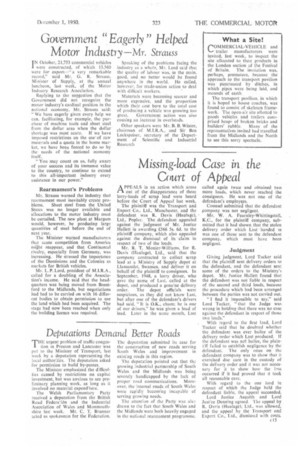Government "Eagerly " Helped Motor Industry —Mr. Strauss IN October, 21,753
Page 57

If you've noticed an error in this article please click here to report it so we can fix it.
commercial vehicles J. were constructed, of which 13,5613 were for export—" a very remarkable record," said Mr. G. R. Strauss, Minister of Supply, at the annual luncheon, last Week, of the Motor Industry Research Association.
Replying to the suggestion that the Government did not recognize the motor industry's cardinal position in the national economy, Mr. Strauss said: " We have eagerly given every help we can, facilitating, for example, the purchase of machine tools and sheet steel from the dollar area when the dollar shortage was most acute. If we have imposed restrictions on the use'of raw materials and a quota in the home market, we have been forced to do so by the needs of the national economy itself.
"You may count on us, fully aware of your success and its immense value to the country, to continue to extend to this all-important industry every assistance in our power."
Rearmament's Problems
Mr. Strauss warned the industry that rearmament must inevitably create pro blems. Sheet steel from the United States was no longer available and allocations to the motor industry roust be curtailed. The new plant at Margarn would, however, be producing large quantities of steel before the end of next year.
The Minister warned manufacturers that acute competition from America miiht reappear, and that Continental rivalry, especially from Germany, was increasing. He stressed the importance of the Dominions and the Colonies as markets for British vehicles.
Mr. L. P. Lord, president of M.I.R.A., called for a doubling of the Association's income. He said that the headquarters was being moved from Brentford to the Midlands, but negotiations had had to be carried on with 16 different bodies to obtain permission to use the land which had been acquired. The stage had now been reached when only the building licence was required. Speaking of the problems facing the industry as a whole, Mr. Lord said that the quality of labour was, in the main, good, and no better would be found anywhere in the world. He called, however, for trade-Lin-ion action to deal with difficult workers.
Materials were becoming scarcer and more expensive, and the proportion which their cost bore to the total cost of producing a vehicle was growing too great. Government action was also causing an increase in overheads.
Other speakers were Mr. B. B. Winter, chairman of M.I.R.A., and Sir Ben Lockspeiser, secretary of the Department of Scientific and Industrial Research












































































































